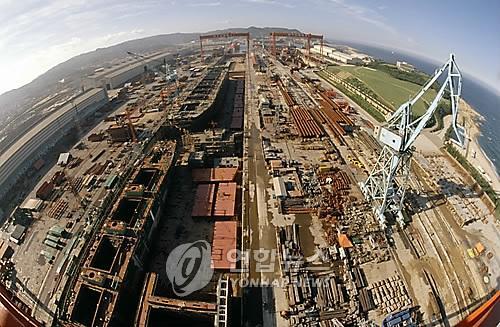A slew of companies ranging from shipping, shipbuilding to petrochemicals and steel -- once Korea’s growth engines -- exposed to financial risks stemming from downturns and bad debts are about to face rigorous restructuring spearheaded by the top financial regulator.
The Financial Services Commission said Tuesday that it will carry out the so-called “three-track” system of corporate restructuring. Under the scheme, the regulator in collaboration with other state agencies and creditor banks will identify and restructure companies suffering from an industry slowdown; companies showing signs of default on their debt; and those with overcapacity.

Shipping and shipbuilding companies such as Hyundai Merchant Marine, Hanjin Shipping, Hyundai Heavy Industries, Samsung Heavy Industries and Daewoo Shipbuilding & Marine Engineering will top the list for major debt restructuring.
With billions of dollars of policy bank loans held by shippers and shipbuilders that are about to turn bad, massive job loss are inevitable, in addition to the increase in asset sales during the restructuring process led by Korea Development Bank and Export-Import Bank of Korea.
To this end, the FSC has called on the Ministry of Finance and the central bank for help to increase capital buffers of policy banks, whose BIS capital adequacy ratios have declined on increasing exposure to bad debt. KDB’s BIS capital adequacy ratio stood at around 14 percent, while Korea Eximbank’s was 10 percent last year.
“We have asked for support from the Finance Ministry and the Bank of Korea,” said FSC chairman Yim Jong-yong.
“The need to boost their capital base comes as policy banks must meet basic financial health to preemptively deal with the upcoming restructuring.”
Yim added that FSC will further evaluate the books of KDB and Korea Eximbank to come up with estimates for capital increase and restructuring costs, and soon push forward with the overhaul. A task force consisting of the Finance Ministry, FSC, BOK, KDB and Korea Eximbank will be formed.
Capital from the fiscal and monetary policymaking agencies will likely be injected into KDB and Korea Eximbank through bonds, the proceeds of which will be used by banks to reduce their bad debt exposure. This would not only increase the burden on taxpayers -- as the government may have to issue debt securities for capital injection -- but also calls for a legal revision to allow the central bank to finance policy banks’ debt.
There are growing concerns on whether the state-run banks can handle massive restructuring with their exposure to debt held by the big three shipbuilders and two shipping companies reaching about 12 trillion won ($10 billion).
KDB extended loans worth over 7 trillion won to these companies that are struggling to make interest payments, while Korea Eximbank lent about 5 trillion won.
The FSC said it will hold talks with political parties as the restructuring involves job losses, as well as issues of labor reforms. However, it insisted that restructuring should be carried out by creditor banks and companies.
“The government will seek support from lawmakers to minimize risks, but we should abide by a (market) principle and not get too involved with the problems facing each company,” Yim said.
By Park Hyong-ki (
hkp@heraldcorp.com)







![[Today’s K-pop] Blackpink’s Jennie, Lisa invited to Coachella as solo acts](http://res.heraldm.com/phpwas/restmb_idxmake.php?idx=644&simg=/content/image/2024/11/21/20241121050099_0.jpg)
